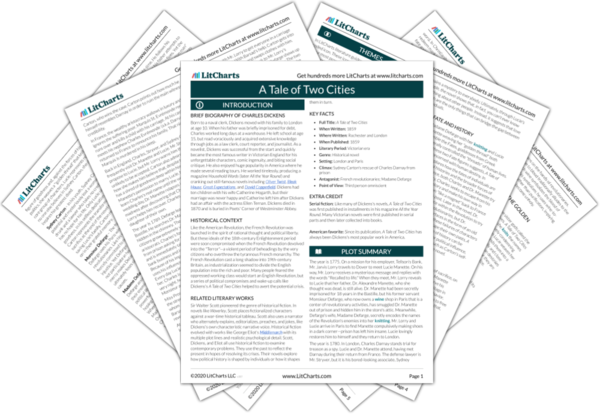Minor Characters
Marquis St. Evrémonde
Charles's uncle and a cruel French aristocrat committed to preserving the power of the French nobility. He and his twin brother exemplify the tyrannical and uncaring aristocracy. When the Marquis is murdered, his corpse is a symbol of the people's murderous rage.
Mr. Jarvis Lorry
An older gentleman who works for Tellson's bank, Lorry is a model of loyalty and discretion. Lorry hides his emotions under the cover of "business," but he works hard to save the Manettes and to encourage Charles to become Lucie's husband.
Mr. Stryver
A lawyer who defends Charles Darnay. Stryver, as his name implies, only cares about climbing the professional ladder.
John Barsad (a.k.a Solomon Pross)
Barsad was born Solomon Pross, brother to Miss Pross, but then became a spy, first for the English, then later for the French government. He is an amoral opportunist. In England, he accuses Charles Darnay of treason.
Jacques Three
"Jacques" is the code name for every male revolutionary; they identify themselves by number. Jacques Three is a cruel, bloodthirsty man who represents the corruption of the Revolution's ideals. He controls the jury at the prison tribunals.
The Vengeance
A peasant woman from Paris and Madame Defarge's ultraviolent sidekick. Like Madame Defarge and Jacques Three, The Vengeance enjoys killing for its own sake, not for any reasonable political purpose.
The mender of roads (the wood-sawyer)
A French working man who represents how average people become seduced by the worst, most violent qualities of the Revolution.
Gabelle
A servant of Charles Evrémonde who carries out Charles's secret charities. Gabelle is jailed simply by association with the aristocracy, showing how justice flies out the window during the Revolution.
Roger Cly
A spy and colleague of John Barsad who faked his death to escape prosecution.
Miss Pross
The long-time, devoted servant of Lucie Manette. She is Solomon Pross's sister, and hates the French.
Monseigneur
A powerful French aristocrat.
